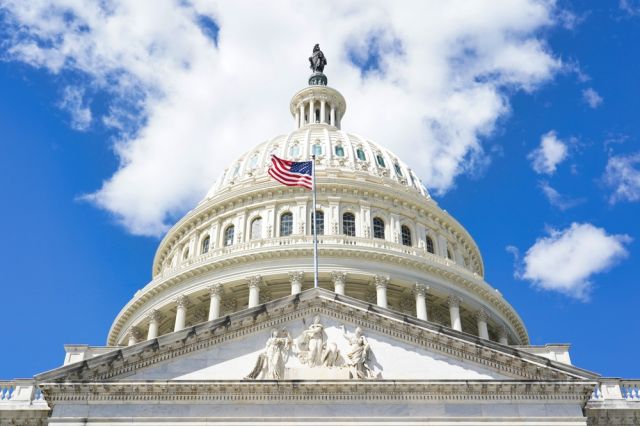
On July 22, Senators Joe Manchin (I-West Virginia) and John Barrasso (R-Wyoming) publicized the Energy Permitting Reform Act of 2024. (Source: Shutterstock)
A bipartisan proposal to accelerate the current federal permitting process for energy and mineral projects could have profound implications for the industry, particularly in the courtroom.
The reforms in this bill tackle litigation delays for energy projects across all sectors, Tom Sharp, director of permitting intelligence for Arbo, told Hart Energy. Arbo tracks energy-related regulatory and permitting decisions.
“If passed, the fact that this bill includes such measures would make it the most consequential reform passed to date, particularly for the midstream,” Sharp said.
On July 22, Senators Joe Manchin (I-West Virginia) and John Barrasso (R-Wyoming) publicized the Energy Permitting Reform Act of 2024. Manchin has publicly advocated for permitting reform, motivated by the difficulties faced during the construction of the interstate Mountain Valley Pipeline, which was delayed repeatedly by litigation prior to its completion in June.
The proposal would specifically prevent any pause related to new LNG export authorizations implemented by the Biden administration, imposing a 90-day timeframe for the Department of Energy to provide LNG export authorizations or denials. In early July, a Louisiana judge’s ruling halted the pause, although Sharp said it’s unclear whether the decision would affect current Department of Energy policy.
RELATED
CERAWeek: Energy Secretary Defends LNG Pause Amid Industry Outcry
According to Sharp’s review of the legislation, the proposed bill would also establish limits on permitting litigation, which could re-open the U.S. midstream market to transport projects that cross state lines.
One section of the bill “could increase certainty for financiers and developers of interstate pipelines seeking to avoid the fates of Mountain Valley Pipeline and other projects canceled due to prolonged legal battles and delays, such as Constitution, PennEast, and Atlantic Coast,” Sharp said.
Manchin hopes Congress will take up the bill before its August recess, Politico reported on July 23.
Sharp said the legislation faces several challenges. Canceling the LNG pause will be a hard sell to much of the Democratic party. Probable Democratic presidential candidate Kamala Harris is not seen as being accommodating towards the oil and gas industry as her predecessor.
Congress has two likely chances to move the legislation forward — the farm bill, which must pass by Sept. 30 and the National Defense Authorization Act of 2024.
“Manchin’s efforts to include permitting reform in last year’s NDAA were unsuccessful,” Sharp said. “The political environment hasn’t changed favorably since then; it’s perhaps worse.”
Upon its release, environmental group Earthjustice published a statement in opposition, saying that the U.S. government needs to focus on building energy infrastructure that decreases fossil fuel use.
The Energy Workforce and Technology Council lauded the legislation, saying it was necessary for the large increases in energy demand predicted by government and industrial leaders.
"Achieving this build-out in a timely manner will not be possible without permitting reform. Critical projects are delayed for years due to unwarranted legal challenges and bureaucratic red tape,” said Energy Workforce President Tim Tarpley in a press release. “Additionally, the legislation addresses the critical need to end the disastrous LNG permitting pause, which threatens the energy security of our closest allies during a time of war. It is my hope that both sides of the aisle will support this important piece of legislation and pass it into law before the end of this Congress.”
Recommended Reading
Six New Dean Wildcats Come With 95% Oil in Northern Midland Basin
2025-02-21 - SM Energy reported geologic variability in deposition in the new play in southern Dawson County, Texas, but “it's really competitive.”
Vital, SM: Woodford-Barnett Wildcats Flush with Barrels in Southern Midland
2025-02-25 - An initial SM Energy test made 250,000 boe in its first eight months online. Vital Energy is reporting more than 150,000 gross boe per 10,000 ft of lateral in its first-six-month output.
E&Ps IP’ing 76%-Plus Oil from New Irion County Wells in Midland Basin
2025-04-14 - Drillers in Irion County are stepping up the pace this year, D&C’ing already as many wells as were brought online in all of 2024. The county has a “bad reputation” for being gassy but is showing up with 76%-plus oil wells.
SM’s First 18 Uinta Wells Outproducing Industry-Wide Midland, South Texas Results
2025-02-20 - Shallow tests came on with 685 boe/d, 95% oil, while deeper new wells averaged 1,366 boe/d, 92% oil, from two-mile laterals, SM Energy reported.
Coterra’s Rigs ‘Stay Camped Out’ in Delaware Basin Mega-DSU Drilling
2025-02-26 - With 57 wells already in one “row” development, Coterra Energy has 16 more underway, plus rigs at work on two more mega-DSU developments totaling 90 wells.
Comments
Add new comment
This conversation is moderated according to Hart Energy community rules. Please read the rules before joining the discussion. If you’re experiencing any technical problems, please contact our customer care team.






